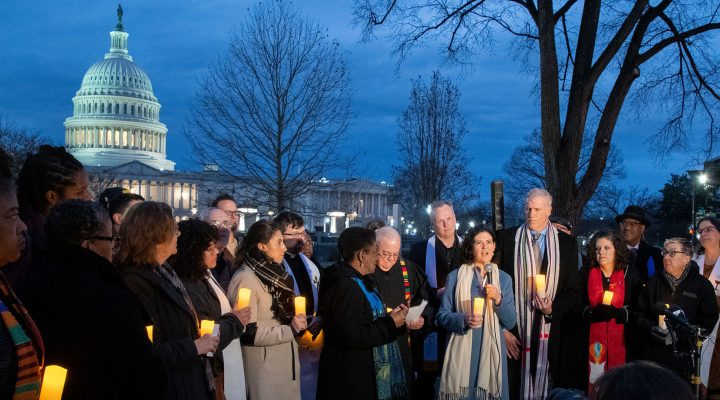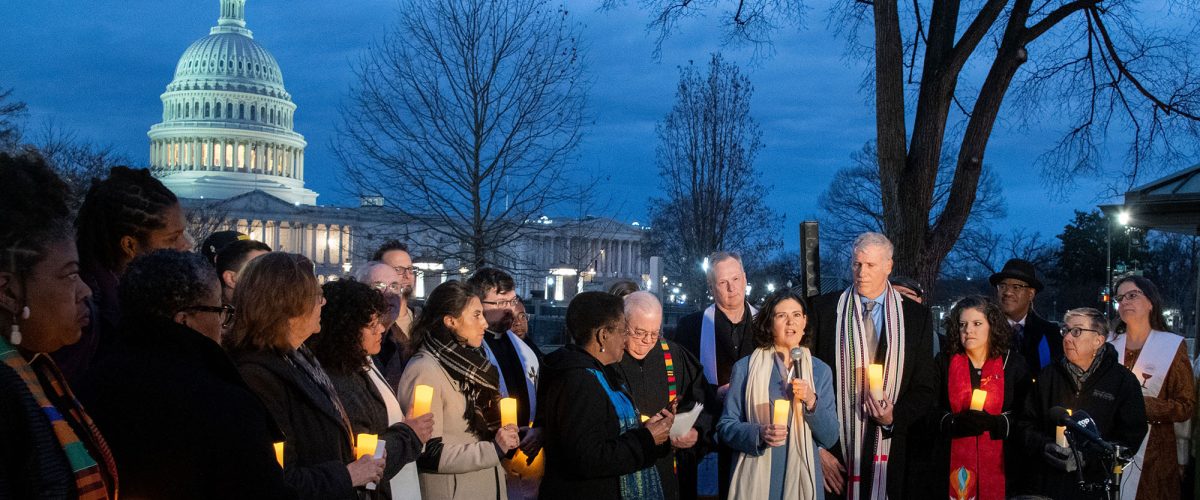Christian leaders gathered for a sunrise prayer vigil at the U.S. Capitol Jan. 6 to commemorate the two-year anniversary of the 2021 insurrection and to seek divine guidance and protection in the struggle against the ideology of Christian nationalism.
Event co-organizer Amanda Tyler, executive director of the Baptist Joint Committee for Religious Liberty and lead organizer of Christians Against Christian Nationalism, said the Jan. 6 anniversary should be a reminder that the threat to democracy did not end with the attack on the Capitol.
“Tragically, Christian nationalism intensified the attacks on Jan. 6, 2021, and Christians bear a special responsibility in continuing to draw awareness to Christian nationalism as a threat to our democracy and to showing how it is a gross distortion of the Christian faith that we hold dear,” she said.
Co-sponsored by Faithful America, the “Sunrise Prayer Vigil for Democracy” featured prayers from about 15 clergy from a wide range of Christian traditions, with many more in attendance.
“This morning we are providing a counter-witness, a way to bring our faith into the public square in productive ways, knowing we claim a right to the public square as do people of all faiths and no faith as well,” Tyler said.
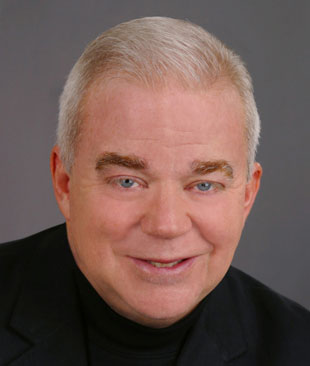
Jim Wallis
Sojourners magazine founder Jim Wallis offered a prayer connecting the anniversary of the insurrection to the Christian holy day of Epiphany, which concludes the 12 days of Christmas and is celebrated annually on Jan. 6.
“We are here to reclaim Jesus on this day of epiphany, calling Christians to stand up and condemn white Christian nationalism in all its heretical forms as not only wrong and dangerous, but also unholy,” said Wallis, currently chair in faith and justice at the McCourt School of Public Policy at Georgetown University.
“This false epiphany, this false religion, this false gospel of white Christian nationalism was certainly present on that Epiphany Day of 2021. But true religion, the true gospel of Christ, must be part of any response to this day as well. The best answer to bad religion is truth,” Wallis said.
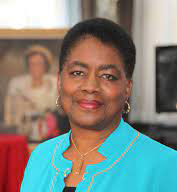
Barbara Williams-Skinner
Barbara Williams-Skinner, convener of the National African American Clergy Network, thanked God for divine presence during the Capitol attack.
“Lord, today we reflect today on the January 2021 insurrection, knowing for sure that if you had not been on our side, we would have perished along with our fragile democracy,” she said. “Thank you, God, for holding back the tide of … white supremacy that shamefully includes white Christian nationalism in an increasingly diverse America.”
Williams-Skinner offered praise for divine power over the efforts of Donald Trump and his supporters on that day: “Thank you, Lord, for exposing the lie that a defeated former president won the election and for saving the overpowered law enforcement, lawmakers and a vice president whose very lives were threatened by the mob he inspired.”
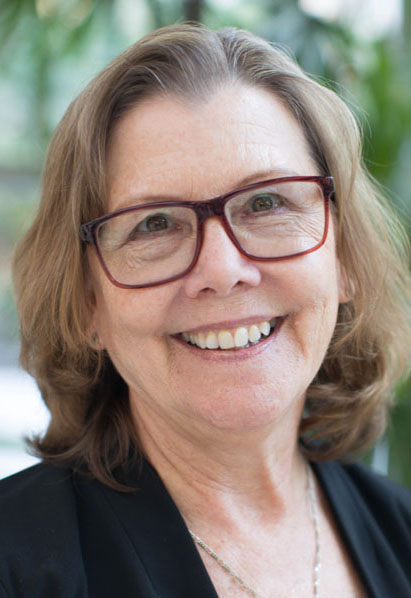
Mary Novak
Mary Novak, executive director of Network Lobby for Catholic Social Justice, echoed parallels between the events of Jan. 6 and Epiphany, which in Scripture came at a time of rising political violence that had to be navigated by the magi who visited the infant Jesus.
“Like those wise people, God grant us your insight and wisdom in the face of disinformation and conflict,” she prayed. “Help us find the courage to reject unholy and harmful ideologies, those of white supremacy and Christian nationalism. And we pray to not be silent about the crisis of our democracy. Grant us, we the people of the United States, the strength and the wisdom to do the hard work of shaping the future of our precious and fragile democracy.”
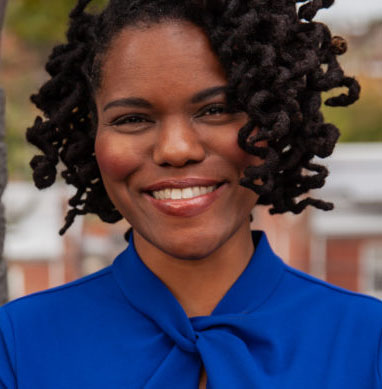
Jeanne Lewis
The key to rejecting Christian nationalism is to stay focused on Christ instead of using him to advance political and social agendas, said Faith in Public Life CEO Jeanné Lewis. “We know that Christ invites everyone to the table, and that every one of us is equally beloved in your eyes.”
Cassandra Gould, senior faith strategist with Faith in Action, opened her prayer with words of grief.
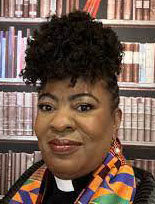
Cassandra Gould
“We come mourning the loss of life on Jan. 6 at the hands of those who don’t believe that democracy belongs to everyone,” she said. “We come this morning because the blood of our siblings continues to cry out from the ground, not just from two years ago today, but from the very founding of this country.
“We come this morning calling forth an America where all of God’s children are welcome, all of God’s children are protected, all of God’s children are served, all of God’s children have a right to voice and vote without impairment.”
Gould pleaded that justice would prevail: “We pray that wicked rulers will not have control over the wisdom that is to take place in the people’s house. We come this morning because the identity of Christians was stolen and paraded around on the steps and in the house two years ago today. So, we come this morning to reclaim our identity.”
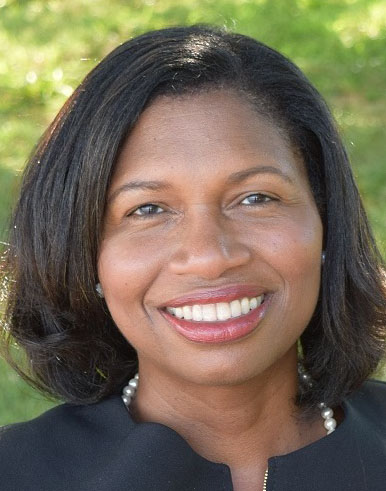
Leslie Copeland-Tune
Leslie Copeland-Tune of the National Council of Churches thanked God the Jan. 6 insurrection didn’t escalate into an even more serious situation. “We give you thanks today that because of your mercy we were not consumed. As bad as it was, it could have been worse. But we also give you thanks … for fortitude and resistance to white supremacy and Christian nationalism.”
Another minister described the vigil as an act of protest.
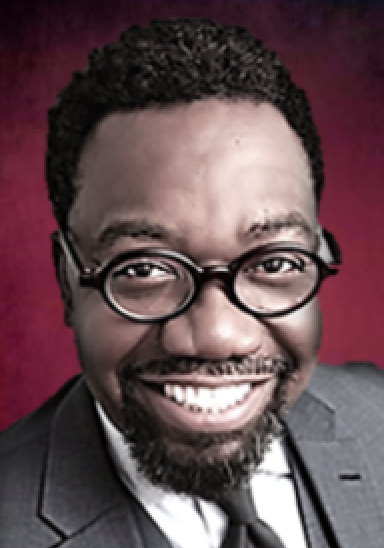
Thomas Bowen
“We are up on our feet this morning, standing up for justice. We come back to take back what the devil tried to take from us,” said Thomas Bowen, minster of social justice at Shiloh Baptist Church in Washington, D.C. “We come here to take back what it means to be Christian in our walk and in our talk. Help us all to be Christian, not just on our resume, but in our day-to-day actions.”
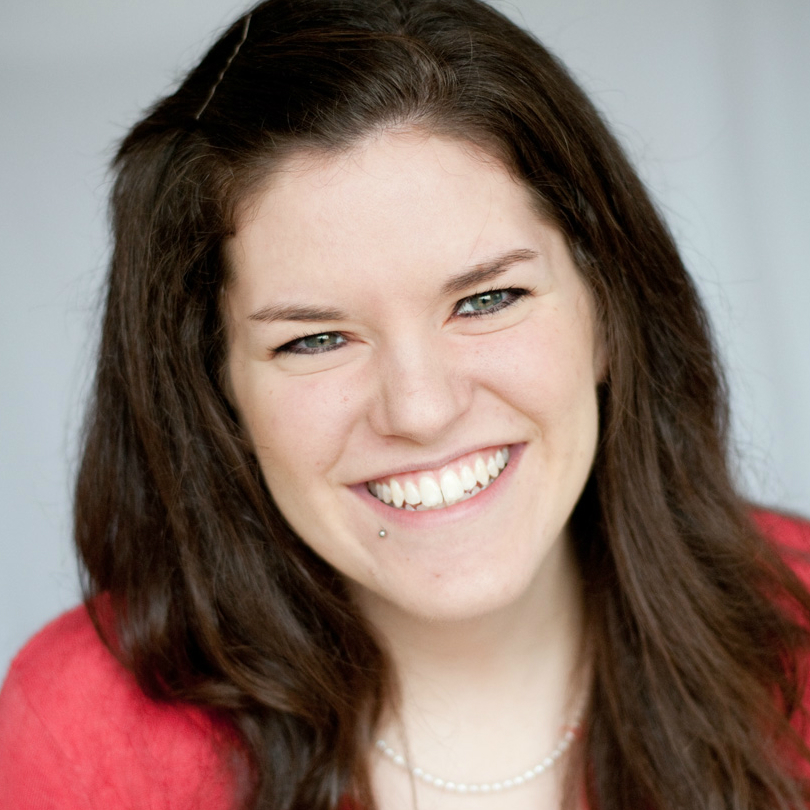
Emily Holladay
Courage was the prayer request of Emily Holladay, pastor of Village Baptist Church in Bowie, Md. “As the sun rises around our Capitol this morning, remind us of the new day that is dawning because of your creative work. Help us to join you in action toward justice so that our country might see the transformation that we know is possible because of you.”
Paul Brandeis Raushenbush, a Baptist minister and president of the Interfaith Alliance, urged that Jesus be remembered as the friend of the outcast, the liberator of the oppressed and as the inspiration of peacemaking. But he also requested discernment in seeing harsher realities.
“God, we ask you on this anniversary of Jan. 6, as so many wolves continue to clothe themselves in sheep’s clothing, help us to recognize those who masquerade as Jesus in their symbols and slogans, but whose hearts are filled with hate and rage and whose tongues spread lies and violence.”
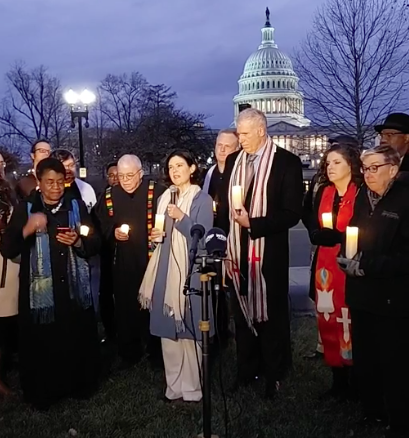 Raushenbush also prayed for light to dispel the darkness of deceit and delusion: “Liberate us from those who would subjugate and bring justice to those who continue to attack our fragile democracy and our nation’s most vulnerable even as they wrap themselves in the American flag and wield the cross that crucified our Lord.”
Raushenbush also prayed for light to dispel the darkness of deceit and delusion: “Liberate us from those who would subjugate and bring justice to those who continue to attack our fragile democracy and our nation’s most vulnerable even as they wrap themselves in the American flag and wield the cross that crucified our Lord.”
Trisha Miller Manarin, executive director of the District of Columbia Baptist Convention, simply prayed for the strength to continue pushing back against Christian nationalism.
“May we not grow weary as we go about your good and sometimes dangerous work, that justice might roll, that kindness might prevail, that truth will be told,” she said.
Author, historian and Simmons College of Kentucky Professor Jemar Tisby offered a prayer declaring white Christian nationalism as evil.
“We come here praying you would protect this delicate democracy and we pray not just for Christians, but we pray for all people in this land,” he said. “We acknowledge their dignity and that they should have a voice in the way this nation is governed. We pray for your help in building a multiracial, inclusive democracy that is helpful for all.”
Shane Claiborne of Red Letter Christians read a passage from Galatians in which Paul admonishes his readers for abandoning the gospel of Jesus for a fake, perverted gospel.
“Christian nationalism is a perversion of the gospel of Christ, and we pray today, O God, that you would deliver us from this perversion of your gospel,” he said. “I do come from evangelical tradition, and we believe in being born again. So I pray that those who have embraced Christian nationalism would have a born-again experience. … I also come from the charismatic tradition, and I pray against the principalities and powers and the authorities in high places that are trying to stand against your love. We call out those principalities of racism, xenophobia, fear, white Christian nationalism and we declare that your love triumphs over them.”
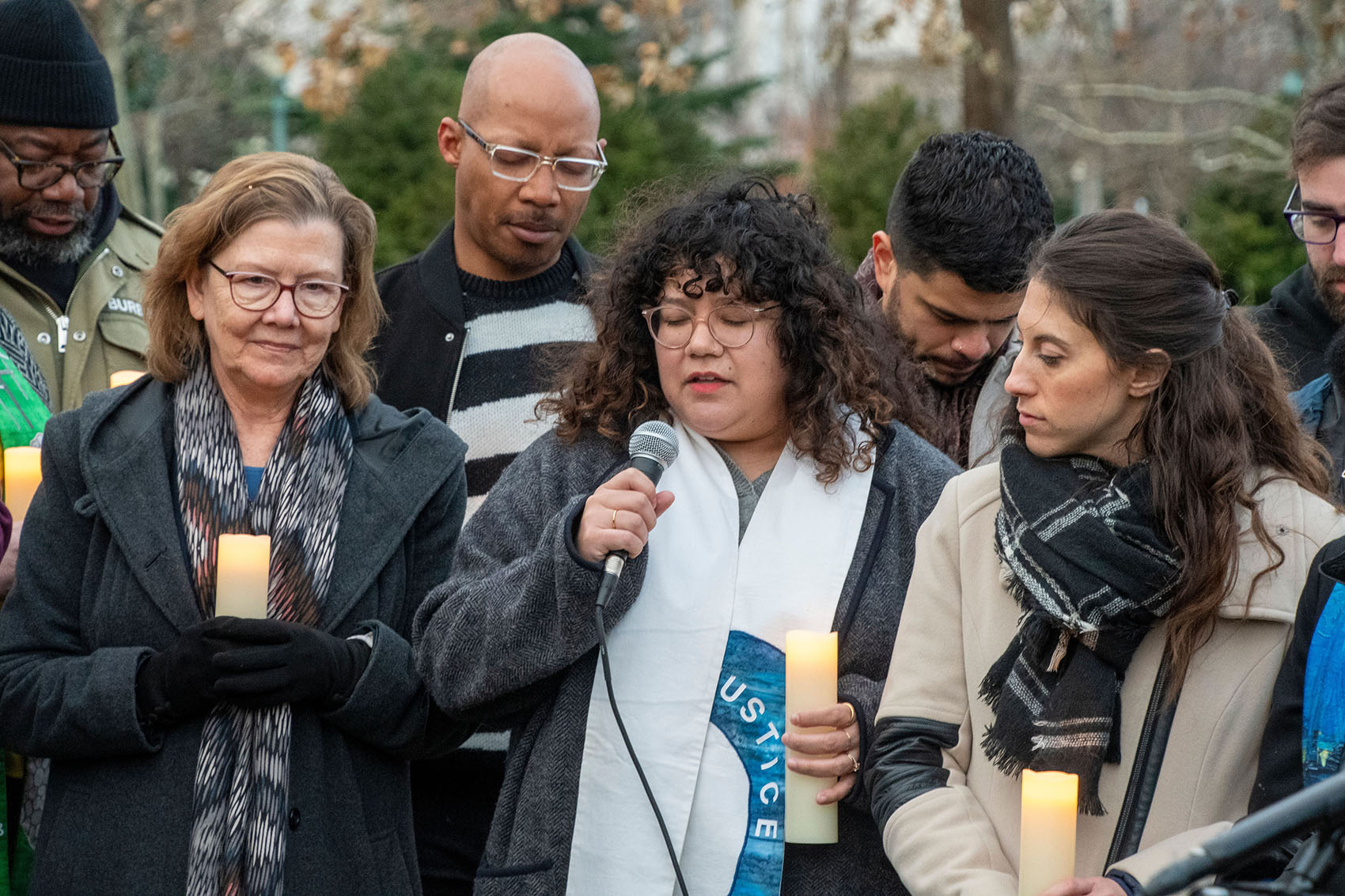
Alyssa Aldape leading in prayer
Alyssa Aldape, an organizer with the National Latina Institute for Reproductive Justice, prayed that opponents of Christian nationalism would remember to examine their own shortcomings in the ongoing struggle.
“We who stand here, let us also look inward. Let us also look at the things within us that perpetuate that power and let us be reminded that that power should not own us,” she said. “Let us also remember that we are called to break down those systems not just here at the marble steps of the Capitol, but also in our own churches, in our own actions, in our own choices.”
Nathan Empsall, an Episcopal priest and executive director of Faithful America, concluded with prayers for those going to work at the Capitol that morning and for those whose loved ones were injured or killed there on Jan. 6, 2021. Then he moved on to the ideology that helped fuel those tragedies.
“We know that white supremacy and Christian nationalism are not Christian, and yet the people who espouse this ideology are our fellow Christians,” he said. “Help us always remember this that we may not be corrupted by hate.”
Empsall also asked that the spiritual truth of Epiphany be visited upon those who espouse the ideology of Christian nationalism: “We ask you God, 2,000 years later, to send another Epiphany to all those who use your holy name to spread election denial and the runup to Jan. 6, and to all those who would take away rights in your name, and who would seize power in your name.”
Related articles:
BJC offers free downloadable report explaining January 6 in light of Christian nationalism
New website illustrates and interprets how religion intertwined with events of January 6
January 6 truth or consequences | Opinion by Erich Bridges

